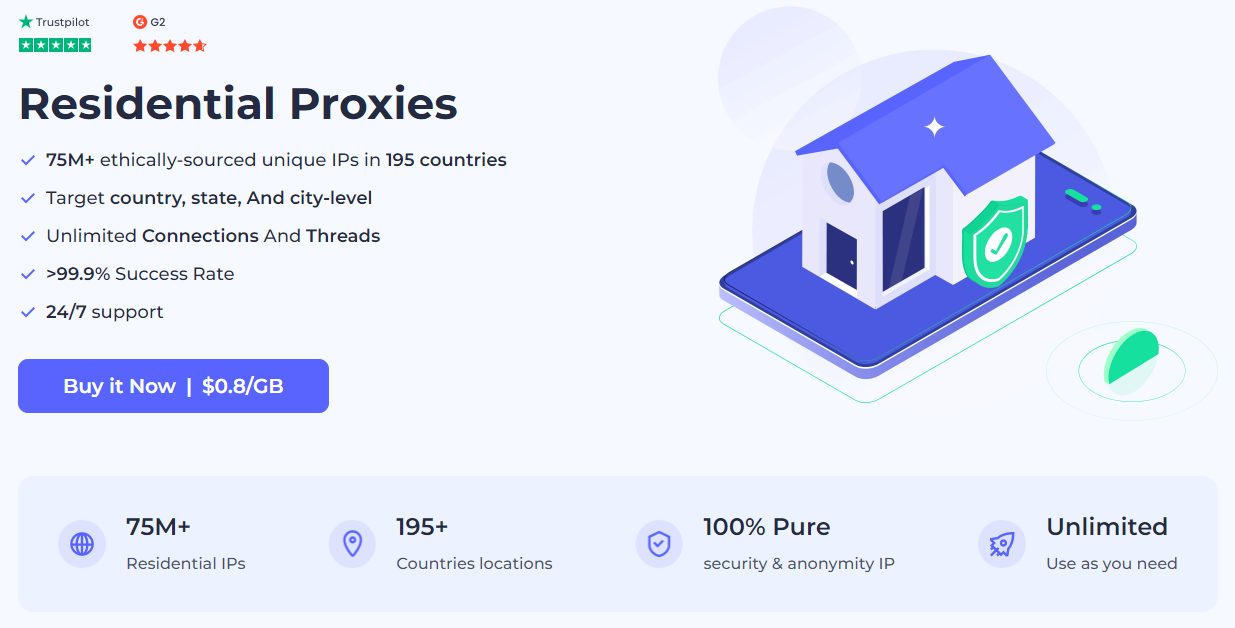
In today’s highly digital world, IP proxy services have become essential tools for many businesses and individual users. Whether it is for protecting information security, accessing websites, or conducting data scraping, proxy IPs have provided significant convenience. However, not all proxy IPs possess high quality, and purity is a key factor to determine it. The purity of a proxy IP not only affects its effectiveness but also directly impacts the user’s network security and data protection. This article explores in-depth what proxy IP purity is, why it is important, how to determine purity, and what to consider when choosing high-quality proxy IPs.
Why Is Proxy IP Purity So Important? What Are the Characteristics of a High-Purity Proxy IP?
Proxy IP purity refers to whether the IP address has a clean usage history, whether it has been frequently used or abused, and whether it is blacklisted.
Websites usually have various detection mechanisms to identify and block proxy IP addresses, especially those that have been frequently abused, like many free proxy IPs. If an IP address has been frequently used or has a bad usage history, it is easily recognized and blocked by target websites. Low-purity proxy IPs can also expose the user’s real identity and location, leading to data security issues.
In contrast, high-purity proxy IPs are usually fresh and not widely used. A pure proxy IP means the address has not been used for malicious activities, is not blacklisted, and has not been heavily utilized. These IPs offer higher anonymity, meaning they are better at hiding the user’s real IP address. Anonymity can be categorized as follows:
Transparent Proxy: Passes on the user’s real IP address and has low purity.
Anonymous Proxy: Does not pass on the user’s real IP address but tells the target server that the user is using a proxy.
Elite or High Anonymous Proxy: Neither passes on the user’s real IP address nor informs the target server that the user is using a proxy and has the highest purity.
Specifically, high-purity proxy IPs have the following characteristics:
Not Blacklisted: Blacklists are used by websites and service providers to record and block malicious IP addresses. If an IP address is blacklisted due to involvement in malicious activities (like sending spam or conducting DDoS attacks), it cannot be used normally on many websites and services.
Not Frequently Used: High-purity proxy IPs should be fresh and not heavily used. Frequently used IP addresses are easily detected by target websites and suspected to be part of proxies or botnets.
Genuine Geolocation: Pure proxy IPs should have a real geolocation. This means these IP addresses actually belong to a household user, rather than being faked through a VPN or other means.
Clean Usage History: The usage history of an IP address is crucial for determining its purity. A clean IP address should have a clean usage history, free from malicious activities. This includes but is not limited to participating in cyber-attacks, sending spam, or conducting fraudulent activities.
High Reputation Score: A reputation score is a comprehensive tool for assessing the purity of an IP address. IP addresses with high scores typically have higher purity and can provide better performance and security in various business scenarios.
What Scenarios Need High-Purity Proxy IPs?
Now that we understand the advantages of high-purity proxy IPs, where can they be effectively used? Let’s look at some specific examples:
1.Data Scraping and Web Crawling: When we perform data scraping and web crawling, high-purity proxy IPs can help avoid being blocked or banned by target websites, and increase the success rate and efficiency of data collection. For example, scraping product prices, reviews, and sales data from Amazon or performing search result scraping and keyword analysis on Google. Crawlers often simulate multiple users accessing a website simultaneously. If the IP purity isn’t high, it’s easy for the website to detect unusual behavior and block the IP.
2.Ad Verification: Ad verification services need to use clean IPs to simulate real user behavior, so as to ensure the accuracy and authenticity of ad placements. For instance, checking how ads are displayed to different audience segments on platforms like Facebook and Twitter. Clean IPs can prevent ads from being maliciously clicked or blocked, ensuring ad effectiveness and return on investment.
3.Social Media Management: When managing social media and performing automated actions, using high-purity proxy IPs can help avoid detection of unusual behavior by the platform, thus protecting account safety. Platforms like YouTube, Instagram, and Twitter are very sensitive to unusual activity. Using clean IPs reduces the risk of getting banned.
4.E-commerce Activities: On e-commerce platforms like Amazon and eBay, engaging in multi-account operations, flash sales, etc., requires using clean proxy IPs to avoid being banned or restricted by the platform. High-purity IPs help users simulate real buyer behavior, increasing the chances of successfully purchasing items.
5.Network Security Testing: In various enterprise intranets, web applications, cloud service providers, and other environments, using high-purity proxy IPs for network security testing and penetration testing can simulate real user access behavior. This helps accurately assess the system’s security. Clean IPs allow testers to conduct their tests without being detected, ensuring reliable test results.
Of course, the application scenarios for high-purity proxy IPs are not limited to the above examples. They are also very useful in SEO monitoring and analysis, e-commerce price monitoring, multi-account management, and more. So, how do we determine the purity of proxy IPs to better meet our needs?
How to Determine the Purity of Proxy IPs?
Figuring out the purity of a proxy IP is a complex process that involves evaluating multiple factors. Here are some common methods and indicators to assess it:
Blacklist Checking: Use professional blacklist checking tools or services to see if the IP address is listed on major blacklists. IP addresses get blacklisted typically due to past malicious activities or extensive misuse. This method helps to initially filter out impure IP addresses.
Usage History Analysis: By analyzing the IP address’s usage history, you can determine if it has been frequently used or abused. Traffic analysis tools can monitor the IP address’s usage patterns. If an IP address frequently appears in various abnormal activities, its purity is likely low.
Geolocation Verification: Use geolocation verification services to check if the IP address’s location is genuine. Fake geolocations might indicate the IP is being masked through VPNs or other proxies. Real geolocations are harder for sites to flag as suspicious.
Reputation Score: Some professional proxy IP services provide a reputation scoring system. These scores are based on the IP address's historical behavior and usage patterns. High-scoring IP addresses usually have higher purity. By referring to these scores, users can quickly filter out high-quality proxy IPs.
What Kind of Proxy Has Higher Purity?
Today, there are various types of proxy IPs available, but residential proxies stand out for their high authenticity, security, and anonymity. Residential proxy IPs are assigned to household users by Internet Service Providers (ISPs). These IP addresses typically have higher purity because they are allocated to real household users rather than data centers or commercial entities. Consequently, residential IPs exhibit normal user behaviors like browsing websites, watching videos, and online shopping. These regular activities make residential IPs less likely to be flagged for abnormal behavior, maintaining their high purity.
Moreover, residential proxy IPs are distributed across different geographical locations, making them more effective for localized services or simulating users from different regions. This geographical distribution also reduces the risk of bulk IP bans. Additionally, compared to data center IPs, residential proxy IPs are less frequently used, minimizing the chances of heavy usage or abuse. This makes residential proxy IPs harder for target websites to detect and more likely to pass through various anti-fraud systems undetected.
Is Purity the Only Thing to Consider When Choosing High-Quality Proxy IPs?
While purity is a crucial factor in selecting high-quality proxy IPs, it is not the only consideration. First, you need to choose a reputable service provider. Reliable providers usually offer high-quality proxy IP services and excel in technical support and customer service.
You should also consider the size and coverage of the IP pool. A large IP pool offers more choices and higher rotation frequencies, reducing the risk of getting banned. Providers with extensive IP pools and broad coverage can offer more stable and continuous IP supply, allowing users to access network data and information from more regions.
Next, look at the stability of the IPs. Stable IP connections ensure business continuity and stability, avoiding disruptions caused by frequent IP changes. High-stability proxy IP services can improve user experience and business efficiency.
Lastly, consider pricing and cost-effectiveness. High-purity proxy IPs are usually more expensive, but if they provide higher success rates and better security, they’re a worthwhile investment.
If you have read this far, you now have a deeper understanding of proxy IP purity and are likely considering high-quality proxy IPs to meet your needs. However, there are not many providers in the market that offer 100% pure proxy IPs. One of the top providers is ProxyShare. As a leading residential proxy service provider, ProxyShare has over 75 million high-quality residential proxies covering over 195 countries and regions. These proxy IPs offer 100% purity, high security, and anonymity. ProxyShare offers residential proxies, static residential proxies, and unlimited residential proxies, catering to various needs.

In conclusion, the purity of proxy IPs plays a crucial role in online security and data protection. High-purity proxy IPs not only avoid blacklist bans but also provide higher success rates and security in various business scenarios. Determining the purity of a proxy IP requires considering multiple factors, including blacklist checks, usage history analysis, geolocation verification, reputation scores, and user feedback. However, when choosing high-quality proxy IPs, purity is not the only factor. We also need to consider the provider’s reputation, the size of the IP pool, IP stability, bandwidth and speed, and pricing. ProxyShare, with its massive IP pool, 100% pure IPs, and various proxy services and packages, offers safe and reliable proxy services. So, what are you waiting for? Click on residential proxies to learn more and start to use!


